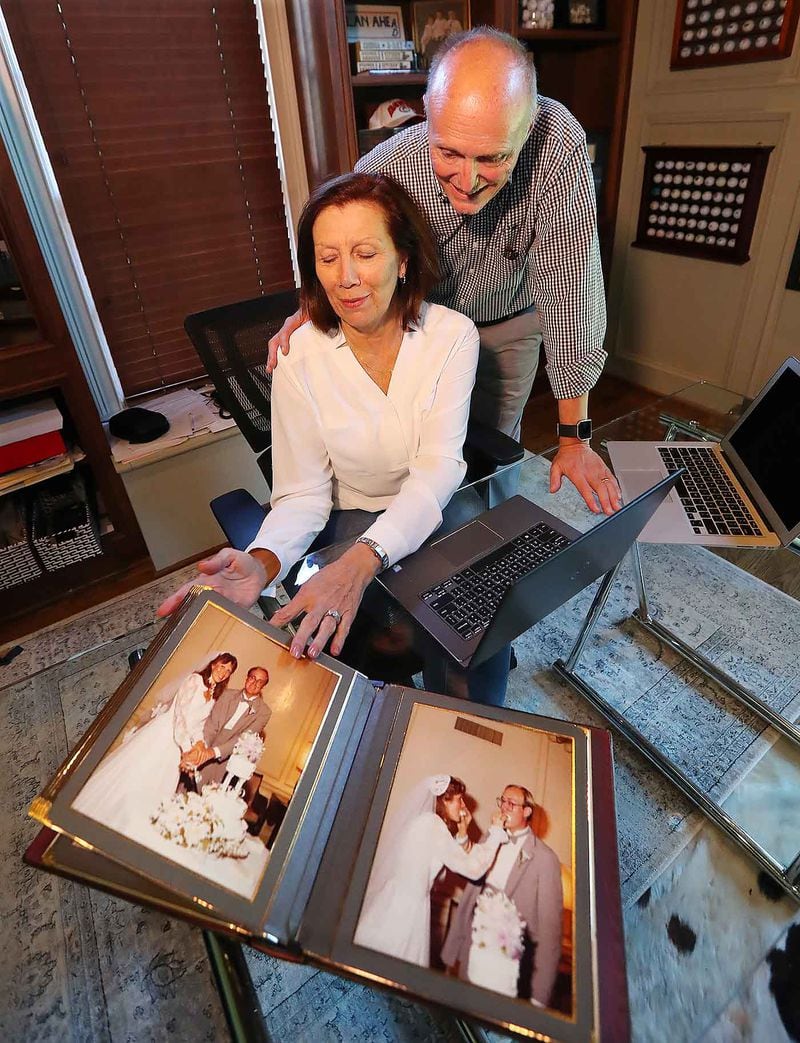After a year of drama in Washington over Obamacare, this week the reality lands in Georgia homes.
On Wednesday, the federal health insurance exchange market opens for business for the next 45 days, selling 2018 plans. The rate increases that insurers, politicians and advocates have threatened and feared for months will now show up on shoppers’ screens complete with numbers and a dollar sign.
Furthermore, while all eyes were turned this year to the tumultuous effort to repeal and replace Obamacare, also known as the Affordable Care Act, piece by piece the Trump administration was chipping away at the law’s mechanics. Now that cracked machinery must crank up, responsible for enrolling millions of Americans into ACA plans.
Georgians with a stake in open enrollment are at their stations.
A North Georgia enrollment guide whose organization saw its funding plummet is taking on more work to fill the gap — and bracing for clients who are far more confused than usual. A business owner in Americus has sat with his agent three times to try to understand his prospects.
An agent in Carrollton is dreading premium prices he can hardly bear to tell clients. A couple in Milton is taking drastic measures to keep their choice of plans.
“The finger-pointing is doing no one any good but the politicians,” said Doug Patterson, a businessman who is losing his Blue Cross Blue Shield plan largely as a result of the tangle in Washington. “People are getting hurt in this implosion.”
Whether they continue to enroll in exchange plans despite the hurdles, or whether enrollment in the exchange plummets as a result, is a closely watched question for both foes and supporters of Obamacare. All sides know it’s one that could have an impact on U.S. health care for years to come.
‘More uncertainty, confusion’
Marc Jenkins roams North Georgia with Obamacare pamphlets and a laptop in his car. He’s an outreach coordinator and navigator for the nonprofit organization Insure Georgia, which “navigates” Georgians through the Obamacare sign-up process. It’s Jenkins’ second year doing open enrollment with the organization.
This one will be different.
If last year’s clients come in January again, hoping to enroll after school lets out and their schedules calm down, he’ll have to turn them away. For the first time, open enrollment will end Dec. 15. It’s being cut in half from 90 days to 45 days.
The TV and radio advertising that drove many of his poorer or rural clients to call for assistance has been largely defunded. Money for people to assist has been deeply reduced as well, so Jenkins is taking on more work as colleagues have been let go.
The remaining advertising money will be concentrated on internet ads, which the agency running enrollment calls more efficient. But, Jenkins says, that ignores people who don’t have internet and make special trips to libraries when they have to use it. “It’s really more of the rural areas to be hurt more by the funding cuts,” he said.
In addition, TV and radio land where it counts, he added.
“The frequency and the level of trust is totally different,” Jenkins said. “When we need to reach the people who are the decision makers in the family, who are listened to, we need to be able to reach those people through television and radio.”
Even if they know the dates to enroll, people may not think they need to do it.
According to the Kaiser Family Foundation, months of rhetoric like the presidential tweet "Obamacare is dead" have convinced nearly 40 percent of uninsured people that maybe it is. They think that the law's mandate for every individual to have health insurance has in fact been repealed or may not be in effect. That's not true.
If people do show up to enroll, Jenkins is ready for them to be confused.
Karen Pollitz, a senior fellow at the Kaiser Family Foundation, said that even though this year marks Obamacare’s fifth open enrollment, “consumers may face more uncertainty, confusion and misinformation than was the case just before the first open enrollment back in 2013.”
There are helpful developments. On Wednesday the administration opened “window shopping” on the website, allowing people to browse their plan options before enrollment opens.
But the mixed messages and half-changes will make it tougher when he sits down with people, Jenkins said.
"The average consumer can go online by themselves and enroll at healthcare.gov," Jenkins said. "I get it. Where the problem comes in is people don't understand health literacy terms.
“They’re skilled at their craft, whatever that might be. Landscapers. People who clean homes. People who work at Walmart. … They can tell you how to weld anything with their eyes closed. However, insurance is not their cup of tea.”
‘Divorced and living together’
Credit: Curtis Compton/ccompton@ajc.com
Credit: Curtis Compton/ccompton@ajc.com
Doug Patterson understands insurance just fine. He just can’t believe what’s happened to it.
Ever since he retired in 2008, Patterson and his wife, Marketia, have operated a business out of their Milton home. The Pattersons will not be buying their individual Blue Cross plans as usual this year, though that’s what they wanted.
Patterson notes insurance prices were rising before Obamacare, but he says during the Obamacare years “it really started ratcheting up.”
Then came the past year and the roller coaster in Washington over whether the government should pay subsidies called Cost-Sharing Reductions.
Insurance companies and analysts warned that just the uncertainty would cause prices on and off the exchange to rise.
Senators tried to work on a solution but got waylaid.
Two weeks before open enrollment, President Donald Trump announced he would cease paying the subsidies.
The shocker for the Pattersons landed in August: Blue Cross Blue Shield of Georgia, for the first time in living memory, said it would both raise rates and pull out of the individual market — both on and off the Obamacare exchange — in Atlanta and other Georgia metro areas. It cited the uncertainty over the subsidies.
That was the Pattersons’ market.
“The rates and everything went up under Obama, no question about it,” Patterson said. “But these people came in, ‘We’re going to repeal it, we’re going to replace it.’ Now it’s, ‘We’re going to let it implode?’ People are getting hurt in this implosion.”
There are only two companies left offering individual plans in Fulton County, Ambetter and Kaiser Permanente. Both would force the Pattersons to give up their own doctors to be covered.
So the Pattersons went hunting for a solution. First, they decided to change residency. But that plan fell through.
There was one other option.
They could divorce.
A financial adviser friend explained that if they set up their business as a two-person group, they could then get group insurance. But the two people couldn’t be related.
"My wife and I looked at each other and said, 'This can't be a right option,' " Patterson said. "But they said, 'Well, yeah.' "
Only half-believing it was happening, he called a lawyer friend to walk through the steps.
"He goes, 'Well, you split everything up, you go to court. I can do that for you,' " Patterson said. "He goes, 'You'll just be divorced and living together.'"
A cascade of emotions went through the couple. They’ve been married for 35 years.
“The problem is, the more people I’ve talked to, nobody has said that’s wrong,” Patterson said. “Everybody has said, ‘That may be what you have to do.’ ”
In the end, Marketia Patterson got a job with another couple who had decided to form a group. She will insure herself and Doug Patterson and their son. The whole thing seems almost comical now, Doug Patterson says, like a bad dream.
‘Not a happy feeling’
The Pattersons could have afforded the price increases, if they’d been allowed to buy.
Dan McBrayer’s clients often can’t.
McBrayer sells insurance from his office in Carrollton, and the drama over the subsidies has had a very real effect on raising prices for his clients.
Throughout the years of the Affordable Care Act, McBrayer said, for clients just outside of the subsidy bracket, the prices have been grueling.
“When you’re talking to somebody on the phone and they start crying because they can’t afford their insurance and they’ve got to drop it, that’s not a happy feeling,” he said.
On Wednesday the government posted the actual price database so people can window shop for 2018 plans. Georgia’s premium hikes on average are among the top 10 highest in the nation.
McBrayer believes the hash made of the subsidies could drive prices so high that some people just pay the penalty for not having insurance, but he doesn’t know how many yet. After prices came out he emailed a couple of clients. They didn’t respond.
"Unfortunately, there are going to be a lot of people that just can't pay it," he said. "I mean, could you pay $10 for a gallon of gasoline? That's what I relate it to. … We have less choice at a higher price."
McBrayer believes there’s a lot of blame in Washington, but the main problem is that Obamacare got government too involved in the private business of insurance.
He believes Trump’s order expanding access to “association plans” that cover less will be helpful to some people. That won’t happen this year because it will take some time to set up and is not offered yet.
‘Health care refugees’
Tripp Pomeroy and his family of four are going to be OK. They’ll get a new insurance plan that’s still subsidized and costs about the same.
He had to meet three times with his insurance agent to understand that, though.
Pomeroy said the year of single-minded braggadocio about repeal and replace has done damage.
“I’m not sure what their endgame is,” Pomeroy said. “You’re not saving money by having an underinsured, sick population that’s confused.”
Pomeroy has a coffee business in Americus. He and his wife fall within the income bracket that gets federal help to pay for the insurance. This year, what would be a $1,290 premium only costs them $650. It won’t rise much next year, though they have to move to Ambetter.
Like others who qualify for subsidies — who make less than about $98,000 a year for a family of four — the subsidies that the president stopped will be backfilled in other ways. That’s one reason that eliminating the subsidies actually raises the deficit.
That doesn’t mean Pomeroy’s coverage is perfect. Their deductible could clock in at $13,000. Out-of-pocket costs under Obamacare are still steep, and he thinks that needs to be fixed.
Pomeroy’s wife is from Paraguay, so when their daughter needed dental surgery, they flew her down to get the procedure done there for a small fraction of the price here. “We’re health care refugees,” he said. “It’s unbelievable.”
In any case it’s not just about him and his family, he says.
"There are people in different income bands that could see some real whoppers," he said. "We've got employees and their family members, we've got neighbors. We've got an awful lot of people around us who are quite vulnerable."
Pomeroy said he has no idea what open enrollment will bring for them and the rest of the state.
“There’s been so much disruption almost for the sake of disruption,” he said. “I hope that there is sufficient enrollment, and with people’s frustration with the confusion, that more people who have advocated for repeal and replace will come back to the middle to work on a fix.”
About the Author








